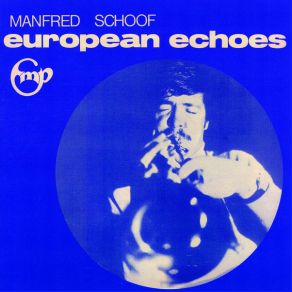European Echoes - Single
Download links and information about European Echoes - Single by Manfred Schoof. This album was released in 1969 and it belongs to Jazz, Avant Garde Jazz genres. It contains 2 tracks with total duration of 30:49 minutes.

|
|
|---|---|
| Artist: | Manfred Schoof |
| Release date: | 1969 |
| Genre: | Jazz, Avant Garde Jazz |
| Tracks: | 2 |
| Duration: | 30:49 |
| Buy it NOW at: | |
| Buy on iTunes $9.99 | |
Tracks
[Edit]| No. | Title | Length |
|---|---|---|
| 1. | European Echoes, Pt. 1 | 15:24 |
| 2. | European Echoes, Pt. 2 | 15:25 |
Details
[Edit]German trumpeter Manfred Schoof, whose work in the '60s focused on the possibilities of the big band in a free jazz context, presented a half-hour free improvisation for German radio in June 1969 that was later released by the FMP label as European Echoes and still later unearthed by Atavistic as part of their estimable Unheard Music reissue series. European Echoes is primarily of interest to free jazz historians and fanciers of the extreme. The historians will be dazzled by the all-star lineup of this 16-member band, featuring guitarist Derek Bailey, saxophonists Evan Parker and Peter Brötzmann, and pianists Fred Van Hove and Alexander von Schlippenbach, all of whom would lead landmark avant jazz sessions of their own. But will the noiseniks be?Well, let's just let the figures speak for themselves: three trumpets, three saxes, two trombones (one of whom doubles on bass), Derek Bailey's proto-Sonic Youth freakout guitar, three pianos, two dedicated bassists (besides the guy who's doubling on bass trombone), and two drummers. All of them going at it full tilt for close to 15 minutes before breaking off into their instrumental groupings for no-less-intense duos and trios. It sounds like it should be a free jazzer's paradise, and there's no denying that the intensity level throughout is amazingly high. The problem is that this enormous band, playing at top volume, is simply too much for the less-than-top-line recording gear that was capturing all this, and for frustratingly long periods (especially in the piece's unison first section), it's all but impossible to pick out what are obviously some inspired individual performances. Schoof may well argue that this was the point, of course.